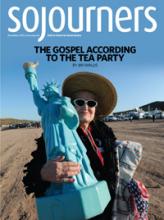In the mid-1970s, I spent a year in Mexico doing neurological research at a hospital caring for severely malnourished children. Most of the babies were so sick when they were admitted that they couldn’t even cry. At the time, in Mexico and Central America, the wind of liberation theology was blowing through the Catholic Church. Carried on the current were the words, "the voice of the poor is the voice of God." Dimly -- I had no blinding road-to-Damascus insight -- I wondered if God could be speaking in the still, small voices of my babies.
When our family returned from Mexico, I went back to my work at Washington, D.C.'s Children’s Hospital, but I was uneasy. I began to dream of a community center for families with infants and young children -- a place that could break the intergenerational cycle of deprivation by offering low-income struggling families education, support, health, and social services early in their children's lives. I mentioned the notion to Gordon Cosby, the minister at the Church of the Saviour, of which I was a member.
About a year later, as I edged around the back of a room where people were sharing supper before classes in the church’s School of Christian Living, Cosby called to me: "Ann, why don’t you tell us about the call you have been hearing?" I wasn’t in the least ready to say anything that evening—or, perhaps, ever. I was annoyed: Was this an invitation or a challenge? But as I talked, I saw two faces in my audience light up. After I finished, Barbara Quist and Betty Price stampeded across the dining room. I learned that Betty’s first grandchild, only a few months old, had Down Syndrome, and the diagnosis was tearing her family apart. Barbara taught a first-grade class in which more than half of the children were not ready to read. Some of them didn’t know their last names.
Read the Full Article

